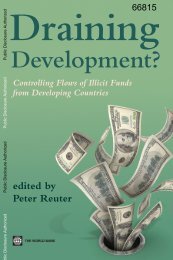International Trade in Services.pdf - DSpace at Khazar University
International Trade in Services.pdf - DSpace at Khazar University
International Trade in Services.pdf - DSpace at Khazar University
You also want an ePaper? Increase the reach of your titles
YUMPU automatically turns print PDFs into web optimized ePapers that Google loves.
298 <strong>Intern<strong>at</strong>ional</strong> <strong>Trade</strong> <strong>in</strong> <strong>Services</strong><br />
Box 9.2: The Four Modes of Supply of Eng<strong>in</strong>eer<strong>in</strong>g <strong>Services</strong><br />
The General Agreement on <strong>Trade</strong> <strong>in</strong> <strong>Services</strong> of the World <strong>Trade</strong> Organiz<strong>at</strong>ion def<strong>in</strong>es<br />
four modes of supply <strong>in</strong> the trade <strong>in</strong> services. The modes of supply are identified to<br />
help trade negoti<strong>at</strong>ors determ<strong>in</strong>e trade commitments <strong>in</strong> trade agreements. Essentially,<br />
the modes are a construct for trade negoti<strong>at</strong>ions and seek to reflect how bus<strong>in</strong>esses<br />
oper<strong>at</strong>e. Most firms use a comb<strong>in</strong><strong>at</strong>ion of some or all the modes of supply to conduct<br />
bus<strong>in</strong>ess. The modes focus on the loc<strong>at</strong>ion of the service provider and the loc<strong>at</strong>ion of<br />
the service consumer. They are def<strong>in</strong>ed <strong>in</strong> the general agreement as follows:<br />
• Mode 1, crossborder supply: Nonresident service suppliers deliver services crossborder<br />
<strong>in</strong>to a client’s territory. For example, a Brazilian eng<strong>in</strong>eer sends sketches to a client <strong>in</strong><br />
República Bolivariana de Venezuela. Mode 1 trade may be <strong>in</strong>hibited, for <strong>in</strong>stance, by<br />
restrictions on Internet use and weak telecommunic<strong>at</strong>ions <strong>in</strong>frastructure.<br />
• Mode 2, consumption abroad: Residents <strong>in</strong> country A purchase services <strong>in</strong>side the<br />
territory of country B. For example, a U.S. oil company established <strong>in</strong> Nigeria buys<br />
services from a local eng<strong>in</strong>eer<strong>in</strong>g firm. Mode 2 trade may be <strong>in</strong>hibited, for<br />
<strong>in</strong>stance, by excessively restrictive capital controls.<br />
• Mode 3, commercial presence: Foreign suppliers of services establish, oper<strong>at</strong>e, or<br />
expand their commercial presence <strong>in</strong> a client’s territory, such as a branch, agency,<br />
or wholly owned subsidiary. For example, a Tunisian eng<strong>in</strong>eer<strong>in</strong>g firm opens an<br />
office <strong>in</strong> Dakar to serve the Senegalese market. Mode 3 trade may be <strong>in</strong>hibited,<br />
for <strong>in</strong>stance, by arduous qualific<strong>at</strong>ion requirements and licens<strong>in</strong>g procedures and<br />
by equity limit<strong>at</strong>ions.<br />
• Mode 4, the temporary movement of n<strong>at</strong>ural persons: This <strong>in</strong>volves the entry and<br />
temporary stay <strong>in</strong> a client’s territory of foreign <strong>in</strong>dividuals to supply a service. For<br />
example, an Indian eng<strong>in</strong>eer supervises a construction project <strong>in</strong> Bangladesh.<br />
Mode 4 trade may be <strong>in</strong>hibited, for <strong>in</strong>stance, by excessively restrictive visa fees or<br />
unpredictable and time-consum<strong>in</strong>g work permit procedures.<br />
Analysts and policy makers can use the modes of supply to identify constra<strong>in</strong>ts to<br />
growth <strong>in</strong> the eng<strong>in</strong>eer<strong>in</strong>g service trade. This understand<strong>in</strong>g can then <strong>in</strong>form policy<br />
decisions to expand the trade <strong>in</strong> eng<strong>in</strong>eer<strong>in</strong>g services.<br />
rel<strong>at</strong>ed technical services to public and priv<strong>at</strong>e sector firms oper<strong>at</strong><strong>in</strong>g <strong>in</strong> the <strong>in</strong>form<strong>at</strong>ion<br />
technology, energy, life sciences, and advanced technology sectors around<br />
the world. Argent<strong>in</strong>e (Tech<strong>in</strong>t), Brazilian (Andrade Gutierrez, Camargo Corrêa,<br />
Odebrecht, and Queiroz Galvão), and Mexican (ICA group) eng<strong>in</strong>eer<strong>in</strong>g and construction<br />
firms have also diversified <strong>in</strong>to other <strong>in</strong>dustries and become large conglomer<strong>at</strong>es<br />
(ECLAC 2007). The list of <strong>in</strong>tegr<strong>at</strong>ed service providers could be made<br />
long, and policy makers should therefore assess potential reforms <strong>in</strong> light of the<br />
commercial structure of the marketplace.<br />
Grow<strong>in</strong>g <strong>in</strong>tern<strong>at</strong>ional demand for eng<strong>in</strong>eer<strong>in</strong>g services <strong>in</strong> developed and<br />
develop<strong>in</strong>g countries cre<strong>at</strong>es employment opportunities for qualified professionals.<br />
However, eng<strong>in</strong>eer<strong>in</strong>g firms <strong>in</strong> a multitude of countries and sectors are<br />
experienc<strong>in</strong>g shortages <strong>in</strong> skilled eng<strong>in</strong>eer<strong>in</strong>g professionals. For example, labor<br />
scarcity <strong>in</strong> the eng<strong>in</strong>eer<strong>in</strong>g and construction sectors has resulted <strong>in</strong> delays and

















